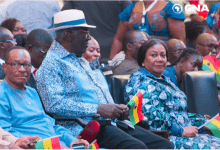The Nabdam District Assembly in the Upper East Region for the year 2018 scored 100 per cent success in the areas of implementation of government’s pro-poor interventions aimed at improving the well-being of Ghanaians, particularly the vulnerable.
The District Performance Assessment Tool (DPAT) was developed to assess the performance of various assemblies in the country to help ensure efficiency, accountability and delivery of basic community services.
This serves as a major criteria to enable the assemblies qualify to benefit from the District Development Fund (DDF) to implement their Medium Term Development Plans and Annual Action Plans to significantly contribute to the advancement of the socioeconomic development of citizens.
This came to light at the meet the press forum organised by the assembly at Nangodi on Friday.
The event was in fulfillment of the directive issued by the Ministry of Local Government and Rural Development to all the assemblies to organise the event.
The District Chief Executive for the area, Mrs Agnes Anamoo stated that apart from the district excelling in the areas of the implementation of the government’s pro-poor policies, the assembly in 2016 and 2017 was rated with 98 and 97 per cent successes respectively.
The DCE indicated that the assembly was poised to maintaining the standard and said a number of projects in various sectors including education, agriculture, health, water and sanitation, among others have been implemented successfully with people benefiting.
On agriculture, she said, 20,840 bags of subsidised fertilisers comprising of 16,840 NPK and 4,000 Urea were issued to 2,277 farmers in 2019 while nine earth dams under the One Village One Dam policy are at various stages of completion in Zua, Nangodi, Pelungu, Sakoti, Asonge, Nyogbare, Zanlerigu, Ndanboug and Kontintabig communities.
She expressed the hope that the dams when completed would boost agriculture production in the area, especially during the dry season and empower the youth to venture into farming as a business.
Mrs Anamoo further revealed that this year, the assembly procured 200 mono desks at the cost of GH₵200,000.00 with funding from the central government and distributed them among schools in the district.
She said the assembly also constructed one 3-unit classroom block at Kongo at a cost of GH₵220,000.00 from the District Development Facility (DDF), a 3-unit classroom block at Yakoti at the cost of GH¢180,000.00 from the District Assemblies Common Fund (DACF), a 3-unit classroom block at Kong-Daborin at the cost of GH₵180,000.00 from DACF and the renovation of 4-unit classroom block at Nangodi at the cost of GH₵129,274.50 from DDF.
To increase the Internally Generated Funds (IGF) of the assembly, it has invested its share of the one million dollars per constituency from the Ministry of Special Initiative into the provision of six 10-seater Water Closet Toilet Facilities at strategic points in the area to serve as places of convenience for people to use and that they were about 90 per cent complete.
She mentioned the construction of the 1,000 tones capacity warehouse under the One district One warehouse initiative at the cost of GH₵250,000.00 from the Central Government as about 92 per cent complete at Nangodi to help mitigate post-harvest losses.
The DCE revealed that the Community-based Health Planning and Services (CHPS) Compounds have since 2017 increased from six to 17 and all of them connected to water sources.
Mrs Anamoo who indicated that the assembly was facilitating the construction of some major roads across the district, added that 2,250 students in the district were also benefiting from the Free Senior High School (SHS) policy with 106 employed under the Nation Builders Corp (NaBCo).
FROM SAMUEL AKAPULE, NANGODI







